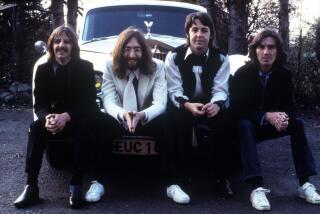MEETING THE BEATLES . . . ON CD
- Share via
Let’s pretend.
Rather than echo the choruses of “Oh, weren’t they wonderful!” that will greet the release Thursday of compact disc versions of the first four Beatles albums, let’s forget nostalgia and t1920540788standards.
That means we need to set aside, for the moment, memories of the early, intoxicating excitement and charm of John, Paul, George and Ringo.
Let’s also forget the innocence and wit in their music and manner, which seemed at the time a virtual prescription from heaven for the nation’s depression following the John F. Kennedy assassination.
Yes, let’s forget all of that for a few moments. Or at least try.
First, some essential information. To standardize the CD packages worldwide, EMI Records is releasing the Beatles albums the way the music was first packaged in England--not the way they were repackaged in this country. This means the early albums have different titles, different cover photos and different song lineups than the ones U.S. fans have known.
Another point: These CDs are in mono rather than stereo. The reason, producer George Martin has explained, is that the early Beatles records were recorded in mono, not stereo.
The recent tendency in the reissuing of classic early rock LPs--from Presley to the Stones--has been to return to the purity of mono. The sound quality of these CDs is forceful, though much sharper on the third and fourth collections.
Now, the albums:
“Please Please Me” (14 songs, 32 minutes)--Opens with “I Saw Her Standing There,” one of the grittiest of the early Beatles hits, and includes spirited versions of outside material (Ringo’s festive vocal on “Boys” and Lennon’s classic singing on “Twist and Shout”). But the arrangements are sometimes corny, and much of the original material is marginal. Some of the non-originals, too, were either carelessly performed (“Baby It’s You”) or poorly chosen (“A Taste of Honey”). The debut’s main appeal is these young English musicians’ obvious enthusiasm for early American rock. On a scale of 100 (90 being excellent), the album--stripped of its nostalgic appeal--deserves a 75.
“With the Beatles” (14 songs, 33 minutes)--The Beatles seem more comfortable in the studio (the rockabilly-accented guitar break on “All My Loving” remains a jewel) and the foursome did a better job of choosing and recording the oldies (including “Roll Over Beethoven” and “Money”). The songwriting, too, was developing. Lennon’s cleverness was begining to show in the way he played the words mind and mine against each other: “And now you’ve changed your mind / I see no reason to change mine.” A new generation was eager add its own vision and voice to the legacy of ‘50s rock, but that voice wasn’t yet focused. 79.
“A Hard Day’s Night” (13 songs, 30 minutes)--This 1964 album, largely featuring songs from the Beatles’ first movie, was the first artistic breakthrough, aided in part by the concentration for the first time on the band’s own material. This resulted in a more unified tone. The record’s sound was much sharper and the songwriting was becoming more personalized. One of the album’s most electric moments was a song that never even made the original film, though it was added in the 1981 re-release: “I’ll Cry Instead,” in which Lennon employed the rockabilly trimmings of his idol Elvis Presley in a way that suggested he knew he was capable of being an equal. “Any Time at All” summarized the buoyancy and desire of the mid-’60s pop-rock scene in a way that still serves as a blueprint for hundreds of bands. 92.
“Beatles for Sale” (14 songs, 34 minutes)--A consolidation of the songwriting advances of “Hard Day’s Night” (notably in “I’m a Loser” and “No Reply”) and the growing confidence in the studio (terrific remakes of “Mr. Moonlight” and “Honey Don’t”). Not as ambitious as “A Hard Day’s Night,” but the foundation was clearly set. The first step to greatness was right around the corner. CD versions of those LPs--”Rubber Soul” and “Revolver” (along with “Help!”)--are due from EMI in April. 90.
More to Read
The biggest entertainment stories
Get our big stories about Hollywood, film, television, music, arts, culture and more right in your inbox as soon as they publish.
You may occasionally receive promotional content from the Los Angeles Times.







